In October 2012, the choir and several clergy of Moscow Sretensky Monastery, at the invitation of Metropolitan Hilarion (Kapral), travelled to parishes of the Russian Orthodox Church Abroad in North America. The trip was dedicated to the five-year anniversary of the reunification of the Russian Orthodox Church. We asked Fr. Tikhon to share some of his impressions from these travels.
“After the reunification of the Russian Church, everything has come into place”
—Fr. Tikhon, you recently returned from your trip to America with the Sretensky Monastery Choir. Five years ago, soon after the Act of Canonical Unity was signed, you travelled around the world with the choir, spending time in dioceses of the Russian Orthodox Church Outside of Russia all over the globe. What has changed since then?
—During the past five years, our brotherly communion and concelebrating of the divine services has become something very natural and habitual. That is what amazes me the most.
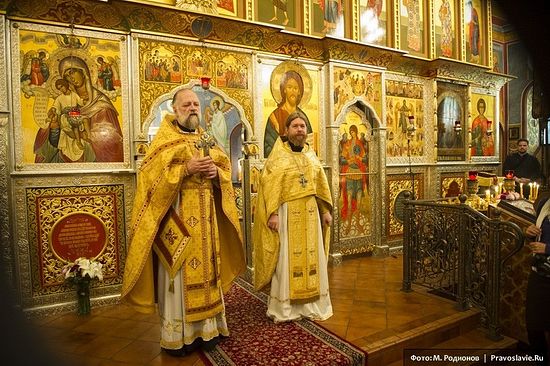 |
| Archpriest Victor Potapov and Archimandrite Tikhon. Photo: Mikhail Rodionov/Pravoslavie.ru |
—Well, God’s will has been fulfilled. But you notice when you look at the photographs of the Church services taken during the trip is that there is a marked difference between the ROCOR parishes and those of the OCA (Orthodox Church in America). In the former you see life bubbling over, but in the latter, a kind of frozenness. 
The St. John the Baptist Cathedral in Washington, D.C., ROCOR. Photo: Mikhail Rodionov/Pravoslavie.ru
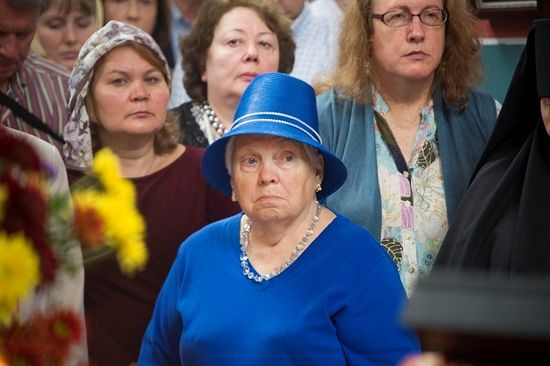 |
| The St. Nicholas Cathedral, Washington D.C., Orthodox Church in America. Photo: Mikhail Rodionov/Pravoslavie.ru |
“Our main goal was to participate in the Divine Services”
—Did people meet the choir everywhere like old friends, or did America discover it all over again?
—Our main goal was to participate in the Divine Services in the parishes of the Moscow Patriarchate, the Russian Orthodox Church Outside of Russia, and the Orthodox Church in America. Alongside this, the choir gave performances in those cities where we visited and served. This performance tour was organized by a large American company.
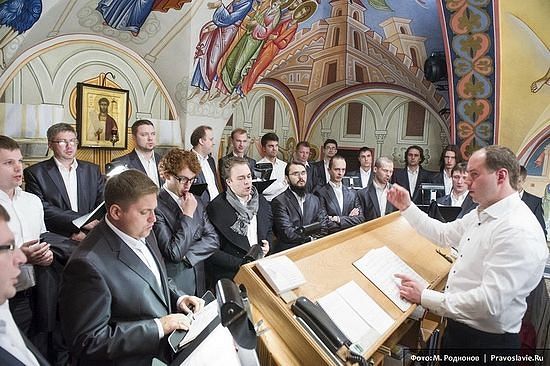 |
I am very pleased with our choir—they spent that month in true self-denial. The schedule was extremely difficult; over the course of twenty days we travelled to nine different cities, and during the entire time they had only one break. The flights were long—not only those from Russia to America and back, but also the American domestic flights. After all, it is a vast country, and it takes five hours to fly from coast to coast.
Often we would arrive at the airport and then have to rush through traffic to the evening services, and only afterwards settle into the hotel. In the morning would go to the Liturgy, in the afternoon would be a recital, and in the evening, a concert. After the concert, late in the evening, again we would drive through traffic to the airport, again go through all the checkpoints, wait for the flight, arrive in the next city, go through baggage claim, more traffic, the hotel, a short night’s sleep, then Liturgy in the morning…
—So perhaps the Washington Post critic was right when she compared you to commandos?
—You could say that. None of our guys ever once complained, although the conditions were rigorous. Nowadays people throw the word podvig (ascetic labors or struggles) around; of course, I would refrain from using such a lofty concept to describe our choir, but the trial was truly serious—they had to give it 100 percent. Well, in fact that is really as it should be.
—After all, they couldn’t lose face before the secular audiences. 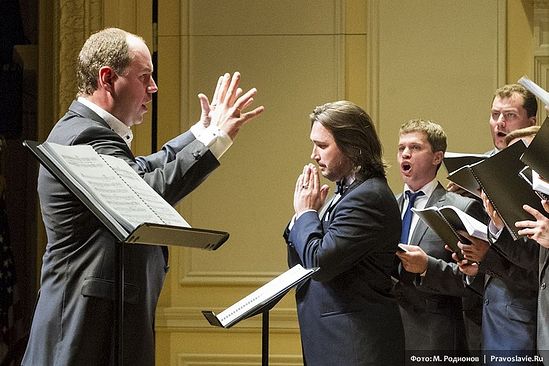
Sretensky Monastery Choir, concert at the Library of Congress.
—Of course, our guys were trying very hard first and foremost to please the people at church services. No matter how tired they were, and at times they were barely alive, they were sometimes asked to sing even more—at dinner, for example, and they never turned these requests down. They understood that this was a holiday for those gathered.
—As for the secular audience—the standard was set very high from the start. After all, the tour began not just anywhere, but in the hall of Library of Congress of the United States, to a very elite public. This concert was only of sacred hymns, from ancient chants to modern church music.
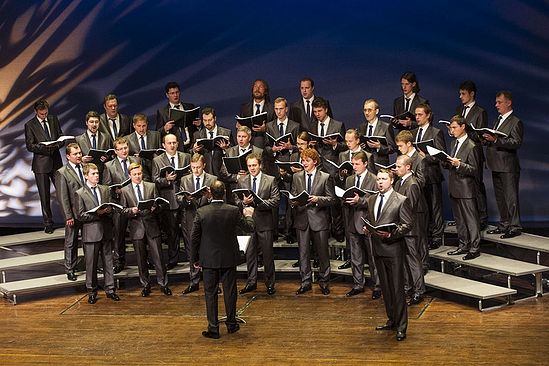 |
| Sretensky Monastery Choir concert, Chicago Symphony Hall. |
—I read on the internet that concert halls were sold out, and leading newspapers in America published ecstatic articles about the choir. The New York Times talked about its “amazing renditions”, and the music critic for the Washington Post declared outright that the choir was “without a doubt one of the best in the world”.
—Yes, we were warmly received. The agents who worked for the company that organized the tour asked us later, “Tell us, where do you dream of performing?” But we only answered, “We are dreaming of getting a good night’s sleep!” It was a very intense trip.
—Regardless of the tight schedule, you had to return to Moscow for a few days after beginning the tour. 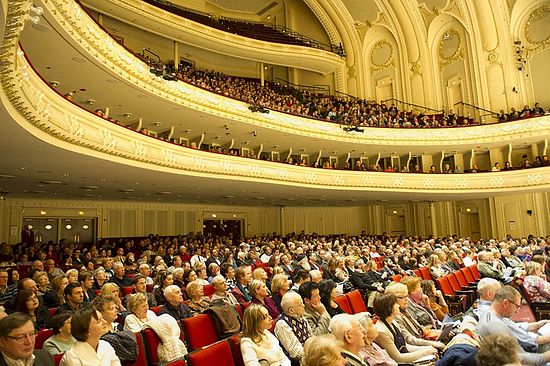
Sretensky Monastery Choir concert, Chicago Symphony Hall.
—Yes, that did happen…
—Spending ten hours in the airplane, taking care of business in Moscow, and then flying back over the ocean… How do you manage to endure such a rhythm?
—I am used to it. I sleep very well in airplanes.
The translator of Everyday Saints was baptized in Sretensky Monastery
—In America you presented the English translation of your book, Everyday Saints, and met with readers. It is interesting that the original, Несвятые святые, received several different titles in its translations into other languages: the literal translation of the Russian title would be “Unsaintly Saints”, but the Greek title became Almost Saints (“Σχεδόν άγιοι”), and the English title became Everyday Saints. How was the book received in America?
—It seems to me that they have received it warmly, and are interested.
—I spoke about this with a specialist at the Russian collection of the Library of Congress, Harold Liech. Although he belongs to the Episcopalian Church, he said that the book is very close to him. 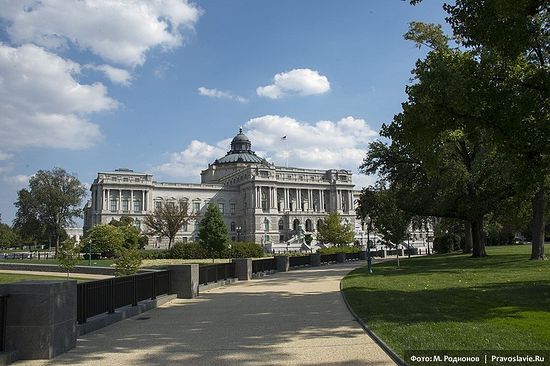
Library of Congress, Washington, D.C. Photo: Mikhail Rodionov/Pravoslavie.ru
—Mr. Liech and his director, Dr. James Billington, organized a presentation of the English edition in the Library of Congress. It is important that Americans who are not Orthodox have received with such interest a book about the Russian Church.
—On the English edition of the website, Pravoslavie.ru, there have been a number of responses to the book. One person wrote just recently that after reading the story of Mother Frosya, who managed to keep the fasts even in prison, he felt ashamed, and resolved to always keep the Wednesday and Friday fasts…
—This kind of relationship to the book is rewarding to me, an author and a priest.
—By the time you returned home, Everyday Saints had been sold for over a month in America and elsewhere; information about it had appeared in the New York Times, the Washington Post, and positive responses had come not only from Orthodox readers, but also from Catholics and Protestants. Into what other languages is the book being translated? 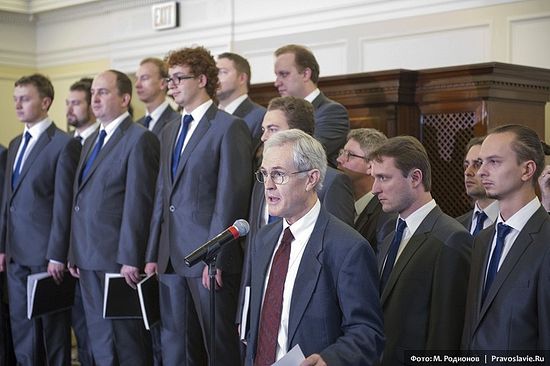
Head of the European Division, Library of Congress. Photo: Mikhail Rodionov/Pravoslavie.ru
—I just recently learned that they are preparing a second print run for the English version. The book has already appeared in Greek and Serbian, and currently work is being done on Spanish, Romanian, Bulgarian, Swedish, French, Chinese, and Japanese editions. It is even being translated into Esperanto.
—I heard that work on the translation of the book had an effect on the translator himself. Tell us a little about this person.
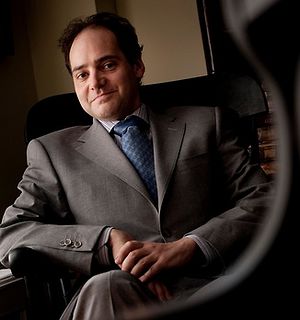 |
| Julian Lowenfeld. Photo: Chris Maliuzhinsky/MOMENT |
Julian was raised in a Catholic family but considered himself an agnostic. It took him about a half a year to translate the book, and when the final editing work was being done in Moscow, he came here to our monastery and unexpectedly announced his firm decision to become Orthodox. Julian wanted to be baptized precisely here, in Moscow. He was told, “You can come and be baptized any time.” Then, without knowing about the ancient Christian tradition of baptizing catechumens on Great Saturday, he arrived in Moscow no earlier or later than Great Friday, and with no other intention than to receive holy Baptism. So, on Great Saturday, we performed the Baptism according to all the rules and canons of the Church. His Godmother was Nun Cornelia, also an American, and one of the editors of the English translation. Of course, I cannot but be overjoyed that the book he translated at least in part influenced him to make that decision.
—The book seems to have a life of its own. For the editors of the website, Pravoslavie.ru who moderate the readers’ comments sent to the address, http://www.ot-stories.ru/comments.htm , this is obvious. And there are incomparably more responses to the book throughout the internet.
—For me this is, I have to admit, the highest reward. I watch the life of the book from a distance; and I have to say, with extraordinary interest.
“America is not the same everywhere”
—You have said that after becoming acquainted with the American public you were amazed at the piety of many Americans. Russia generally has a negative image of America because all the information we receive about that country comes mainly either through news dispatches showing their government’s unseemly role in Syria, Iraq, Afghanistan, etc., or from the movies in which Americans portray themselves as Rambos and Terminators. What do you think: is there really such a perceptible contrast between our concept and the true America, especially “one-story” America?
 |
| New York. |
 |
| Amish people working. |
In 1996, Alexander Nikolaevich Krutov, his family, and I flew to Colorado Springs. This was our first trip to America—we had gone there to receive a copy of the Shroud of Turin, which the famous Shroud researcher John Jackson had expressed a readiness to present to our monastery.
 |
| A rodeo in Reno, NV. |
 |
| The rodeo championship in Colorado Springs. Photo: Anthony Suffle. |
Having eaten a little, I looked around, thinking, “Where are the police?” There are very many people here, and on the tables there was not just food, but also a certain amount of alcoholic beverages. Knowing how this usually ends at analogous youthful gatherings in Russia, I estimated that in an hour or two police intervention would be unavoidable. But there were no police. After a while it dawned on me that they would not be needed. That is because no one behaved aggressively, or brashly, or mischieviously.
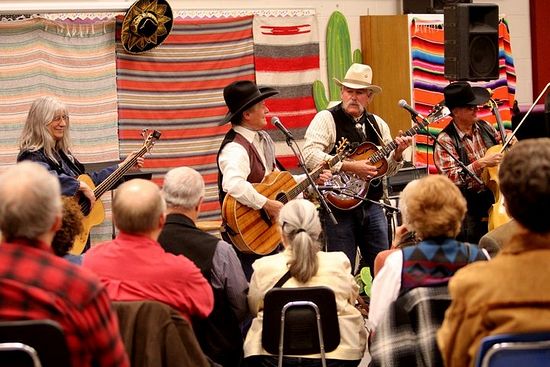 |
| Photo: Reggie Barret. |
It was all a very homey atmosphere. The head cowboy, for example, said, “We have with us today John and Mary. They are on their honeymoon trip. Let’s give them a warm welcome! Let’s be glad for them, that they are so beautiful and young, have had their wedding and are now travelling around our country. John and Mary, come on up!” This young couple comes forward and everyone shouts, “John and Mary, hello! All the best to you!” This was touching, what can I say… This is what we have lost—such goodwill towards each other!... Then they wished someone else a happy birthday, congratulated another on the birth of a grandson…
And apparently our guides had told them about me and the Krutovs, because we suddenly heard, “Some Russians have come to our holiday. We have never had Russians here before. Welcome!” We did not go to the stage, but we stood up and greeted everyone. People all around us also rose from their tables and shouted greeting to us. The master of ceremonies said again, “We are very glad to have you here! It’s great that you have come. Welcome to America!”
A crowd of people immediately gathered around us… They were shaking our hands and smiling. When they had sat down again, the man sitting next to us began a conversation with us. He was thin, modest, with work-worn hands. He asked me, “Are you a priest?” “Yes,” I answered. “We are also Christians. We’re very glad to have made the acquaintance of a priest.” He said that he and his wife are Protestants. I inquired whether he goes to church. He answered in the affirmative. As it turns out, he was an oil man from Texas. Then it turns out that he was not just an oil man, but the owner of one of the largest oil companies in the U.S. Now he and his wife were travelling around America—something they do every year. They had never been out of the country. They had five children. He also said that he had only once skipped Sunday services, when he was in the hospital. So, America is not the same everywhere you go.
—Especially since there are, according to statistics, already five million Orthodox Christians there. Tell us, how does this piety of ordinary Americans jibe with the imperialistic politics of their country? Many of our readers ask that question.
—I would least of all like to talk about politics. But since you have already asked the question, I will answer as best I can; but don’t judge me for it.
The international politics of any empire—and the U.S.A. is undoubtedly an empire—are the unbending defense of its own interests, often at the cost of other countries. I will not be “discovering America” if I say that the strategic aims of the external politics of the “Good Empire” are not complicated, but perfectly clear: to try to control the entire world. No more, no less. This task has been set by that very elite, which, you might say, controls the country. Thinking Americans understand this quite well and do not hide the fact from either themselves or others.
But let’s end the discussion of this boring topic for today. In fact, it’s better if we return to that subject less often.
—Well, Father, we’ll do what we can!
—Let’s make a good attempt!

